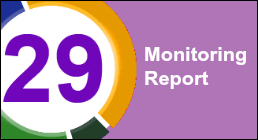Fair Employment Monitoring Report No.29 published

11/02/2020
The Equality Commission has published its 29th Fair Employment Monitoring Report.
The 29th Monitoring Report is drawn from data provided to the Commission by employers, based on their workforces in the year 2018. The total monitored workforce was 563,229, an increase of 22,332 (4.1%).
The breakdown of the monitored workforce by community background was [50.7%] Protestant and [49.3%] Roman Catholic, an increase in the Catholic share of [0.4 percentage points] from the previous year.
Women account for 51.8% of the monitored workforce as they have done for the last three years. Their share of the private sector workforce is at 45.2%, while in the public sector, women account for 65.8% of employees.
In 2018, Roman Catholics represented [52.7%] of all job applicants and Protestants [47.3%], the same as last year. Roman Catholics were [53.3%] of all appointees, and Protestants were [46.7%].
This year, those whose community background was not determined represented 10.9% of the overall monitored workforce, an increase of 1.7 percentage points from the previous year.
Chief Commissioner of the Equality Commission, Dr Michael Wardlow, said: “We continue to see extremely high rate of compliance with the fair employment monitoring regulations by employers.
“The monitoring process itself is making an important contribution to ensuring fair participation in workplaces across Northern Ireland, helping employers to focus on issues within their own workforce and enabling the Commission to work with individual firms and public bodies to address the imbalances revealed.
“Considerations of fairness in employment have enduring relevance for Northern Ireland. Northern Ireland is a very different place to what it was 30 years ago, when fair employment monitoring was introduced, with many people from other countries coming to settle, work and raise their families here.
“The Commission believes the time is right for the fair employment monitoring regulations to change to reflect these realities. We have recommended, for instance, the extension of monitoring requirements to include nationality and ethnic origin to ensure the continuing usefulness of the fair employment monitoring regulations and to enable employers to make a more accurate and meaningful assessment of fair participation in their organisation.”
Notes to editors
- The monitored workforce represents almost 70% of Northern Ireland’s total workforce and includes all public sector employers and all private sector employers with 11 or more employees.
- The monitoring reports have reported the percentages for the community background compositions of the workforce in square brackets [ ] and are based on the Protestant and Roman Catholic community backgrounds only; the Non-Determined are excluded.
Further information